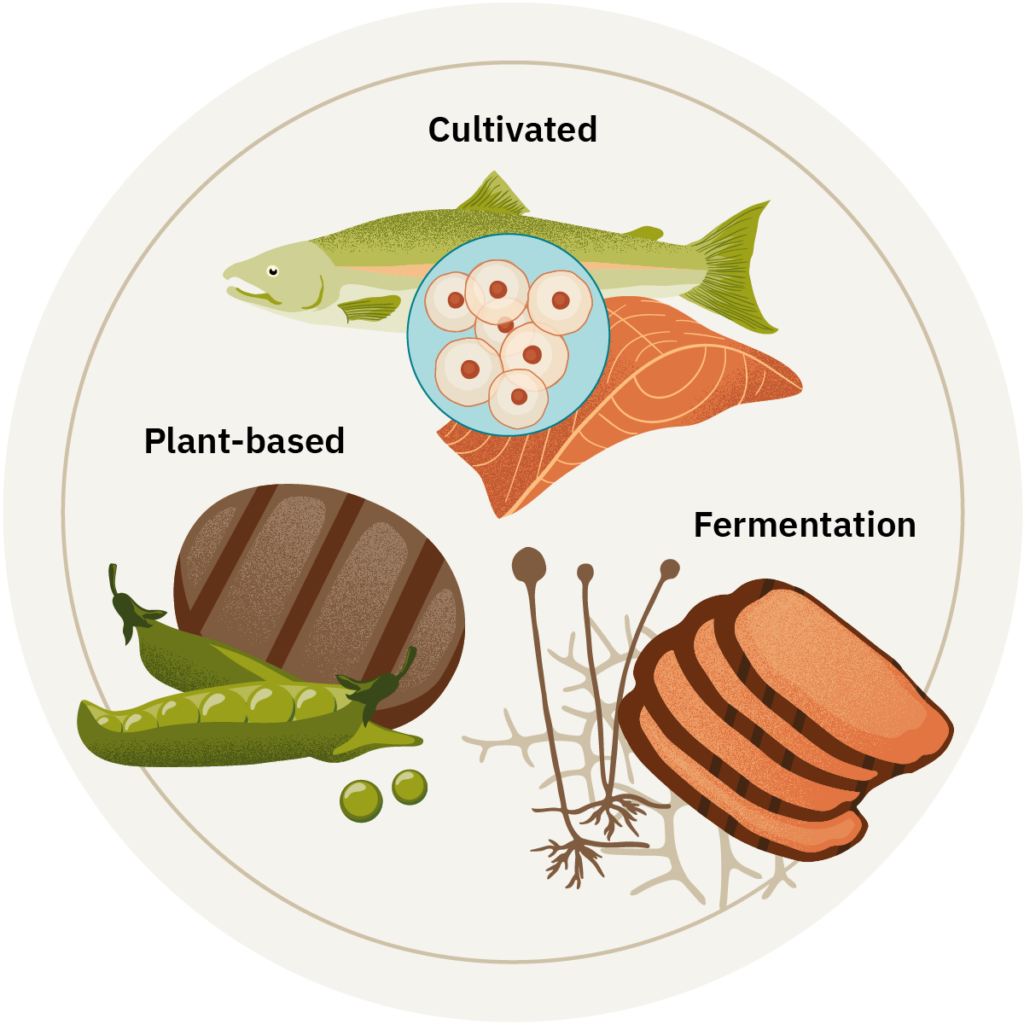
Defining alternative protein
Given how essential alternative proteins are to a global protein transition, the term itself needs to be universally understood, on the tip of more tongues, and at the top of more agendas.
Introduction to alt proteins
What are alternative proteins?
Alternative proteins are proteins produced from plants or animal cells, or by way of fermentation. These innovative foods are designed to taste the same as or better than conventional animal products while costing the same or less. Compared to conventionally produced proteins, alternative proteins require fewer inputs, such as land and water, and generate far fewer negative externalities, such as greenhouse gas emissions and pollution. Some of these products are available to consumers today, including numerous plant-based and fermentation-derived options. Others, such as cultivated meats, remain primarily in development.

Alternative protein production methods

Plant-based meat
This is your guide to plant-based meat. Explore our tools, resources, and expert analysis of this field, from science to policy and markets.

Cultivated meat
This is your guide to cultivated meat. Explore our tools, resources, and expert analysis of the cultivated meat industry.

Fermentation
This is your guide to precision fermentation and whole biomass fermentation for alt protein production. Find resources, tools, and expert industry analysis here.
Why are alternative proteins important?
Alternative proteins offer a better way to feed the world.
Alternative proteins offer a better way to feed the world. Globally, meat consumption is the highest it has ever been, with global meat demand projected to increase by at least 50 percent by 2050. By making meat from plants and cultivating meat from cells, we can modernize meat production in ways that massively reduce the environmental impacts of our food system, feed more people with fewer resources, avoid contributing to the growing threat of antibiotic resistance, and free up land and ocean ecosystems for biodiversity restoration and recovery.

Blog
A boost for the blue economy: The essentialism of alternative seafood
Scaling plant-based and cultivated seafood could help satisfy growing global demand while creating resilient jobs and livelihoods that minimize the climate and biodiversity impacts of seafood consumption. If you’re seeking…

Blog
Seizing the moment: The 10-point story of alternative proteins not being told
Headlines focused on short-term struggles reveal a major blindspot—scientists, policymakers, and industry innovators around the world are making real, on-the-ground progress on bringing delicious, affordable alternative proteins to more plates.

State of the Science
Alternative proteins offer some of the most game-changing research opportunities around the world. Here are the latest developments in the scientific ecosystem.
What needs to be done to advance alternative proteins?
If alternative proteins are to grow at the pace and scale needed to achieve climate and global health goals, increased investments in this game-changing field must be made across the public, private, and civil society sectors. Specifically, we must:
- Advance the science and build the talent pipeline
- Secure open-access R&D funding from global governments and a fair policy playing field that enables alt proteins to compete
- Support and catalyze the private sector to accelerate alternative protein growth
Learn more about how GFI advances alternative proteins

Science
Explore the science of plant-based, cultivated, and fermentation-derived meat. Discover research ideas, funding opportunities, and open-access tools.

Policy
Learn why alt proteins offer solutions to the issues that governments want to address. As a nonprofit, we advocate fair policy and public funding.

Industry
Find market opportunities, open-access resources, and tailored guidance for producing and selling alternative proteins.

Support our work
Our alternative protein research, insights, and advocacy are made possible thanks to our generous, global family of donors. Philanthropic support is vital to our mission. Connect with us today to discuss how you can help fuel this transformative work.
